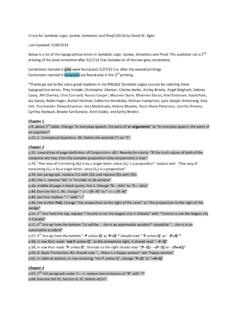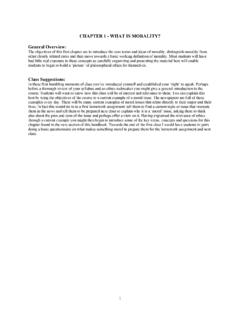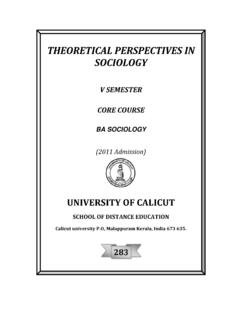Transcription of Lecture 5 – Cultural Relativism - David Agler
1 Lecture 4 Cultural Relativism David Agler 1 L e c tu r e 4 Cultural Relativism I. What is Ethical Cultural Relativism ? A. Cultural Relativism : A moral theory about the nature of morality that contends that moral norms are dictated by socially approved customs. B. MORAL STANDARD: Agreement with Socially Approved Customs C. Disagreement Hypothesis: Morals are culturally generated. D. A challenge to our belief in a universal (transcultural) truth that extends across all cultures. No transcultural moral norms exist. 1. ALL moral values are relative to culture, not merely SOME 2. Ex1: The Jivaro are an Indian clan who lived deep in the Ecuadorian, and neighboring Peruvian Amazon. They are known to be an intensely warlike group, tremendously protective of their freedom and unwilling to subordinate themselves to other authorities. In this fierce society, headhunting and shrinking the heads is a process much revered and honored. In the , chopping off someone s head then soaking it in some type of jungle juice is not only a criminal offence, but held by almost everyone to be immoral.
2 II. Types of Cultural Relativism GEOGRAPHIC TEMPORAL National ( , Peruvian Amazon); State (Indiana); City (Indianapolis); Neighborhood (College Park, Woodruff, Nora, Hogville) Ant iquit y (ho mosexualit y amo ng Spartans); Middle Ages (inhumane torture); Pre-Civil War (slavery); Generation X GEOGRAPHIC TEMPORAL United States during the Vietnam War III. Different from Excusing A. Excusing involves granting an exemption from wrongdoing due to certain circumstances. 1. EX2: We excuse children; they are not charged as adults. 2. EX3: Wrong to skip jury duty, but if you have a valid excuse, you were shot. B. CR contends that you don t need a valid excuse for being a Nazi in Germany; you were morally right since it was acceptable. 1. If you grew up in a Nazi culture, then you don t need to be excused from killing Jews, because what you did was morally correct. 2. Your culture determines rightness and wrongness. IV. Different from Ethical Subjectivism Lecture 4 Cultural Relativism David Agler 2 A.
3 ES contends that individuals create their own moral standards B. CR contends that your culture creates the moral standards 1. You do not determine your morals on your own, they are impressed upon you by external influences. 2. Influenced by your mother, father, country, state, time period. C. Truth is in the eye of the beholder Who is the Beholder? 1. ES Individual 2. CR - Culture V. Different from Sociological Relativism Sociological Relativism Cultural Relativism Type of Ethics Descriptive Ethics Normative Ethics Task Description of the ethics of a societ y What IS Evaluation of the ethics of all societ ies What Ought Makes conclusions about right and wrong No Yes Thinks the other is true Maybe Yes Heavily Accepted Yes No VI. Five Principles Involved in Cultural Relativism Five Principles Involved in Cultural Relativism 1. Descriptive Cultural Relativism : Different societies have different moral codes 2. Plurality or Equality Principle: The moral code of our own society has no special status; it is merely one among many.
4 3. Particularity or Relativity Principle: There is no universal truth in ethics that is, there are no moral truths that hold for all peoples at all times. All moral truths are relative. 4. Cultural Principle/Standard: The moral code of a society determines what is right within a society; that is, if the moral code of a society says that a certain action is right, then that action is right, at least within that society. 5. Tolerance Principle: It is mere arrogance for us to judge the conduct of people outside of society. We should adopt an attitude of tolerance toward the practice of other cultures. VII. The Argument and Consequences for Cultural Relativism A. The Essential Argument for Cultural Relativism Essential Argument for Cultural Relativism P1 If descriptively different cultures have different moral codes, then right and wrong are only matters of opinion, and opinions vary from culture to culture. P2 Descriptively, different societies/cultures have different moral codes C Therefore, there is no objective moral truth, only Cultural Relativism .
5 Lecture 4 Cultural Relativism David Agler 3 O Normative Fact doesn t follow from the descriptive one; one could be right, both could be wrong, etc.; Disagreement doesn t imply no truth, arguments in science. OBJECTION 1: Rejection of P1: Cultural Relativism does not follow from Sociological Relativism . a. Fallacy of Ignorance i. Disagreement does not imply there is no answer. ii. Ex1: Two cultures disagree about whether the world is flat or spherical. But, it does not follow fro m their disagreement that the world is not either flat or spherical. b. Naturalistic Fallacy i. Is doesn t imply ought ii. Ex1: John is running an errand for his mother doesn t imply that John ought to run the errand. iii. Ex2: You are in class on Friday does not mean that you ought to. B. Consequences of Cultural Relativism 1. Equality Consequence We could no longer say that the customs of societies are morally inferior to our own. a. Impotent to criticize other cultures 2.
6 Consultation Consequence We could decide whether our actions are right or wrong just by consulting the standards of society a. Infallibility Objection: Perfect Culture 3. Progress Consequence If morality progresses, then it progresses as a result of the culture, and if we progress as individuals, then we better accord with what society says we should do. a. Temporal Objection: Better culture than before b. Reforming Objection: Individuals that go against the grain. VIII. Arguments Against Cultural Relativism A. Evaluation of the Essential Argument for Cultural Relativism 1. Historical OBJECTION 0 (Plausibility): Holocaust and the Disillusionment a. Argument is that some cultures are morally wrong on the basis that the holocaust was so horrific. Beyond justification. b. Some Considered Moral Judgments upset the reflective equilibrium. B. OBJECTION 2: Pluralism the Reductio ad absurdum 1. What are the limits to a culture? Individuals composed of multiple cultures, geographically and temporally.
7 2. Culture reduces to the individual. Lecture 4 Cultural Relativism David Agler 4 a. Ex1: Polit ical Left/Right/apolit ical. b. Ex2: Conflicting Cultures: John Kerry R. Catholic and Democratic C. Objection 3: CR does not correctly describe how we all make moral judgments 1. We don t consult society every time we make a decision 2. In doing what is right and wrong, are we really motivated by what others think or with doing what is really the right thing. D. Objection 4: There are at least some transcultural values. Situational Differences a. Is the difference really found in our moral beliefs, or in our belief system? b. Eskimos that kill children: respect human life, but live in a harsh environment Argument for Transcultural Value of Protecting the Youth P1 If a culture did not take care of its young, the young would not survive, and the culture would become extinct. P2 Human infants are helpless and cannot survive if they are not given extensive care for a period of years.
8 C Therefore, there is objective moral truth, namely that every Cultural must take care of its young. Argument for Transcultural Value of Telling the Truth P1 If a culture did not have at least some value for telling the truth, communication would be impossible P2 If communication were impossible, a culture would not last. P3 If a culture did not have at least some value for telling the truth, a culture would not last. C Having some value for telling the truth is a transcultural value. 2. General Rule from the Two Arguments for Transcultural Truth a. There are some moral rules that all societies will have in common, because those rules are necessary for a Cultural to exist. b. Therefore, not every moral rule can vary society to society. E. Objection 5: Cultural Relativism Creates a WE/They Mentality 1. CR is not synonymous with tolerance a. Rejects: Tolerance Principle: It is mere arrogance for us to judge the conduct of people outside of society.
9 We should adopt an attitude of tolerance toward the practice of other cultures. 2. Tolerance is a transcultural value, and not adopted by every culture. Lecture 4 Cultural Relativism David Agler 5 a. Nazi s are not tolerant of Jews 3. CR contends that lack of tolerance is morally acceptable in certain societies. a. EX1: Slavery, which was morally acceptable pre-Civil war, is morally acceptable, but certainly does not involve tolerance. IX. Cultural Relativism s grain of truth A. Warns us about the dangers of assuming that all our preferences are based on some absolute rational standard. B. Makes us aware that some of our customs are in fact relative, possibly trivial 1. Ex1: Funeral Practices 2. Ex2: Public Nudity C. Cultural Relativism provides an antidote for our Cultural prejudices. KEEP AN OPEN MIND. 1. Ex1: Homosexualit y a. Our strong feelings against homosexuals might not be the product of any strong universal moral value, but the result of a Cultural prejudice.
10 B. Many of the practices and attitudes we think are so natural are really only Cultural products. D. Situational Differences 1. Encourages us to think about how situational differences affect how we view moralit y a. Ex1: Abortion i. Pro-Life argument that we should not have an abortion because we can put our children up for adoption. ii. What if we live in a society where there is no adoption available, and if we have the child we will not be able to properly take care of him or her? 2. Situation often influences what we think is right and wrong, and these situation differences are often a product of certain Cultural values. X. Exercises A. , ex#4 B. , ex#2 C. , ex#3 XI. END MATTER A. History of Cultural Relativism (Benedict) 1. Herodotus Histories For if anyone, no matter, who were given the opportunity of choosing from amongst all the nations of the world the set of beliefs which he thought best, he would inevitably, after careful consideration of their Lecture 4 Cultural Relativism David Agler 6 relat ive merits, choose that of his own country.











